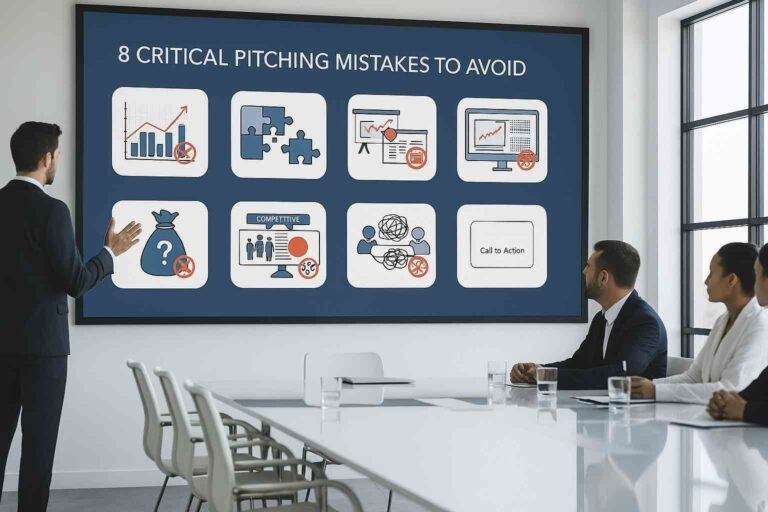Introduction
Imagine walking into a room full of investors with a great idea but no way to explain it clearly. That’s where a pitch deck becomes your secret weapon. A pitch deck is a short, visual presentation that explains your startup’s story, value, and future in just a few slides. For startups aiming to raise funds, build clarify their vision, a well-crafted pitch deck is essential. Whether you’re just starting out or ready to scale, here are 9 powerful reasons why every startup needs a pitch deck.
What is a Pitch Deck?
A pitch deck is a short, visual presentation that gives a quick overview of your startup. It includes your idea, the problem you’re solving, how your product works, your business model, and how you plan to grow. Pitch decks are mainly used during investor meetings or startup events to communicate your business clearly and quickly.

Why Do Startups Need a Pitch Deck?
Startups are fast-moving, idea-rich, and often complex. Explaining a new business idea in just a few minutes — and making it sound compelling — is hard without structure. That’s where a pitch deck comes in.
Having a well-made pitch deck helps startups:
- Tell their story with clarity and confidence
- Impress investors in limited time
- Show traction, projections, and vision
- Build credibility as a serious business
- Open doors to funding, partnerships, and media attention
It’s not just a slide deck. It’s your startup’s voice, vision, and validation — all packed into a few powerful slides.

1. Makes Your Startup Easy to Understand
A startup might solve a complex problem, but if the explanation is unclear, the audience won’t get it. A pitch deck simplifies your startup’s purpose by breaking it into easy-to-grasp segments like the problem, solution, product, and market. Through visual storytelling, you can explain what your startup does — even to someone hearing about it for the first time. This clarity can make all the difference in gaining attention and support.
2. Saves Time for You and Investors
Time is limited — especially in investor meetings. A pitch deck is a quick yet complete snapshot of your business that can be presented in under 10 minutes. Instead of going through lengthy documents or emails, investors get an immediate sense of whether your idea is worth exploring further. It streamlines conversations and leaves more room for meaningful discussions.
3. Creates a Strong First Impression
Your pitch deck is often the first thing investors see about your startup — and first impressions matter. A well-designed deck with clean visuals and compelling content shows you are serious, organized, and ready. It reflects your professionalism and can influence how investors perceive your business, even before they look at numbers.
4. Keeps You Focused on What Matters
While building your startup, it’s easy to get lost in daily tasks. Creating a pitch deck forces you to sit down and think deeply about your core mission, business model, customer segment, and goals. It helps you define what truly matters and serves as a reference point to align your team and decisions moving forward. It’s like writing your own roadmap.
5. Helps You Raise Funds
Fundraising is one of the biggest reasons startups build a pitch deck. Investors want to see proof — not just passion. A pitch deck gives them everything they need to know: how big the opportunity is, what makes your solution unique, and how you plan to grow. It builds a logical, visual case for why someone should invest in your vision. Startups often seek help from pitch deck design agencies to ensure their message is both strong and visually convincing.
6. Tells a Memorable Story
People connect with stories, not spreadsheets. A pitch deck gives you the chance to tell the “why” behind your startup — the inspiration, the challenge, the breakthrough. Instead of overwhelming the audience with data, you guide them through a story they can remember and retell. A good story makes your idea stick in the minds of investors long after the meeting ends.
7. Serves as a Versatile Business Tool
Your pitch deck isn’t just for investors. You can use it to onboard new team members, pitch to potential partners, negotiate with vendors, or present to media. It acts as a go-to business summary that you can adapt for different purposes. With minor tweaks, the same deck can be repurposed across multiple scenarios where you need to communicate your startup’s value quickly and clearly.
8. Builds Investor Confidence
Investors look for confidence backed by planning. When your pitch deck includes realistic financial forecasts, a sound business model, a go-to-market plan, and traction milestones, it signals that you’ve done your homework. It shows you’re not just chasing a dream — you’re building a business. This transparency builds credibility and makes investors more likely to believe in you.
9. Helps You Stand Out from Competitors
In a crowded startup landscape, you need to be memorable. A sharp, well-organized pitch deck gives you a competitive edge. It helps investors remember your business when they’re choosing between multiple pitches. Working with professional pitch deck services can help you stand out by combining persuasive messaging with stunning design that highlights your uniqueness.
Final Thoughts:
If you’re building a startup, a pitch deck isn’t optional — it’s foundational. It captures your vision, validates your model, and opens doors to funding, partnerships, and growth.
Whether you’re bootstrapping or chasing VC funds, having a pitch deck is your first step toward success.
FAQs – Pitch Deck for Startups
1. What is a pitch deck used for?
It explains your startup idea clearly to investors and helps raise funds.
2. How many slides should a pitch deck have?
Usually 10–15 slides that cover key topics like idea, market, and team.
3. Does a pitch deck help get investment?
Yes. It builds trust and shows investors your plan and growth potential.
4. Should I hire a designer for my pitch deck?
Yes, a design expert can make it more clear, visual, and professional.
5. What are common pitch deck mistakes?
Too many slides, no clear story, missing financials, or poor visuals.









